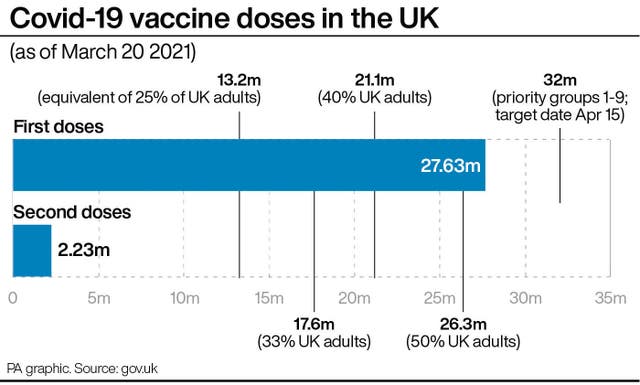EU warned against ‘vaccine nationalism’ as jabs row intensifies
Health minister Helen Whately said no country or bloc should engage in protectionism over the deployment of jabs.

The European Union has been warned not to engage in “vaccine nationalism” over proposals to block exports of coronavirus jabs to the UK.
Care minister Helen Whately said European Commission president Ursula von der Leyen should stick to a commitment not to block pharmaceutical companies from meeting the terms of contracts to supply vaccines.
Ms von der Leyen, who is under pressure over the EU’s relatively poor vaccine rollout, has ramped up the rhetoric this weekend, saying the EU has the power to “forbid” exports, adding: “That is the message to AstraZeneca.”
The warning reflects growing frustration on the continent that the EU is not getting the supplies it expected from the British-Swedish manufacturer.
The Prime Minister is expected to contact his EU counterparts ahead of virtual summit on Thursday where European leaders are due to consider the matter.
Government sources said Mr Johnson spoke to Ms von der Leyen, along with Dutch and Belgian prime ministers Mark Rutte and Alexander De Croo last week.
He may speak to other EU leaders over the coming days, the Government source added.
Reports have suggested the latest focus of the row is on AstraZeneca vaccines produced in the Halix plant in the Netherlands, with officials arguing they should be kept for the EU rather than allowed to be exported to the UK.
Ms Whately told BBC Radio 4’s Today: “What we’re hearing at the moment is some speculation, some conjecture, an element of rhetoric.
“But what is actually important is that the EU and no country should follow vaccine nationalism or vaccine protectionism.
“We expect the European Union to stick by their commitments and I’m sure the Prime Minister will be in contact with European counterparts – he speaks to European counterparts regularly – but I don’t think this debate is helpful to anybody.
“What matters is for all countries to be getting on and deploying and vaccinating their population.”
Asked whether the UK would retaliate if the EU did impose a block on vaccine exports, Ms Whately said: “I don’t think it is very helpful to speculate at the moment. I don’t think this is a helpful line to go down.”
Labour leader Sir Keir Starmer told LBC Radio: “I don’t think the EU is helping itself here, I don’t think it has helped itself much in the last few weeks and months on the whole question of the vaccine.
“I don’t think they should go down this road of banning exports.”
The UK is already facing a squeeze on vaccine supplies in April and Sir Keir said the dispute with the EU needed to be resolved as quickly as possible “because we don’t want any shortage in vaccines to interrupt the rollout in this country”.
The use of the Oxford/AstraZeneca jab in Europe has been hit by fears over blood clots, although the European Medicines Agency concluded it was a “safe and effective” jab.
On Monday, data from a US-led trial showed the vaccine is 79% effective at preventing Covid-19 and offers 100% protection against severe disease,.
The jab, which has been the subject of controversy in Europe over concerns about links to very rare blood clots, is also 100% effective at keeping people out of hospital with severe illness.
Some 32,449 people across all age groups took part in the phase three trial in the US, Chile and Peru, with a total of 141 cases of symptomatic Covid-19 reported.
The results showed that among people aged 65 and over, there was 80% protection against developing Covid-19.
The degree of effectiveness against symptomatic Covid-19 was even higher than observed in the Oxford-led clinical trials.
An independent data safety monitoring board (DSMB) also identified no safety concerns relating to the vaccine.
Across the EU, just over 10% of adults have received a first dose of a Covid-19 vaccine but in the UK the figure is over 50%.
Ms von der Leyen has suggested the EU “will reflect on whether exports to countries who have higher vaccination rates than us are still proportionate”.
Around 10 million doses of vaccine, mainly the Pfizer jab, have crossed the English Channel to the UK but Brussels has complained that no AstraZeneca doses have been sent in the other direction.

Mr Johnson celebrated “a record-breaking day for the vaccine rollout” in the UK after 844,285 jabs were given to members of public on Saturday.
NHS chief executive Sir Simon Stevens said: “In just one day we vaccinated the equivalent of the entire adult populations of Liverpool, Southampton and Oxford combined.”
Ireland’s EU commissioner Mairead McGuinness acknowledged on BBC1’s Andrew Marr Show that European citizens were “growing angry and upset” that the vaccine rollout had “not happened as rapidly as we had anticipated”.
She said: “Both the EU and the UK have contracts with AstraZeneca and my understanding is the company is supplying the UK but not the European Union.
“We are supplying the UK with other vaccines, so I think this is just about openness and transparency.”
Defence Secretary Ben Wallace hit back by warning the manufacture of the Pfizer vaccine depends on supplies from the UK.
“The grown-up thing would be for the European Commission and some of the European leaders to not indulge in rhetoric but to recognise the obligations that we all have,” he told The Andrew Marr Show.





